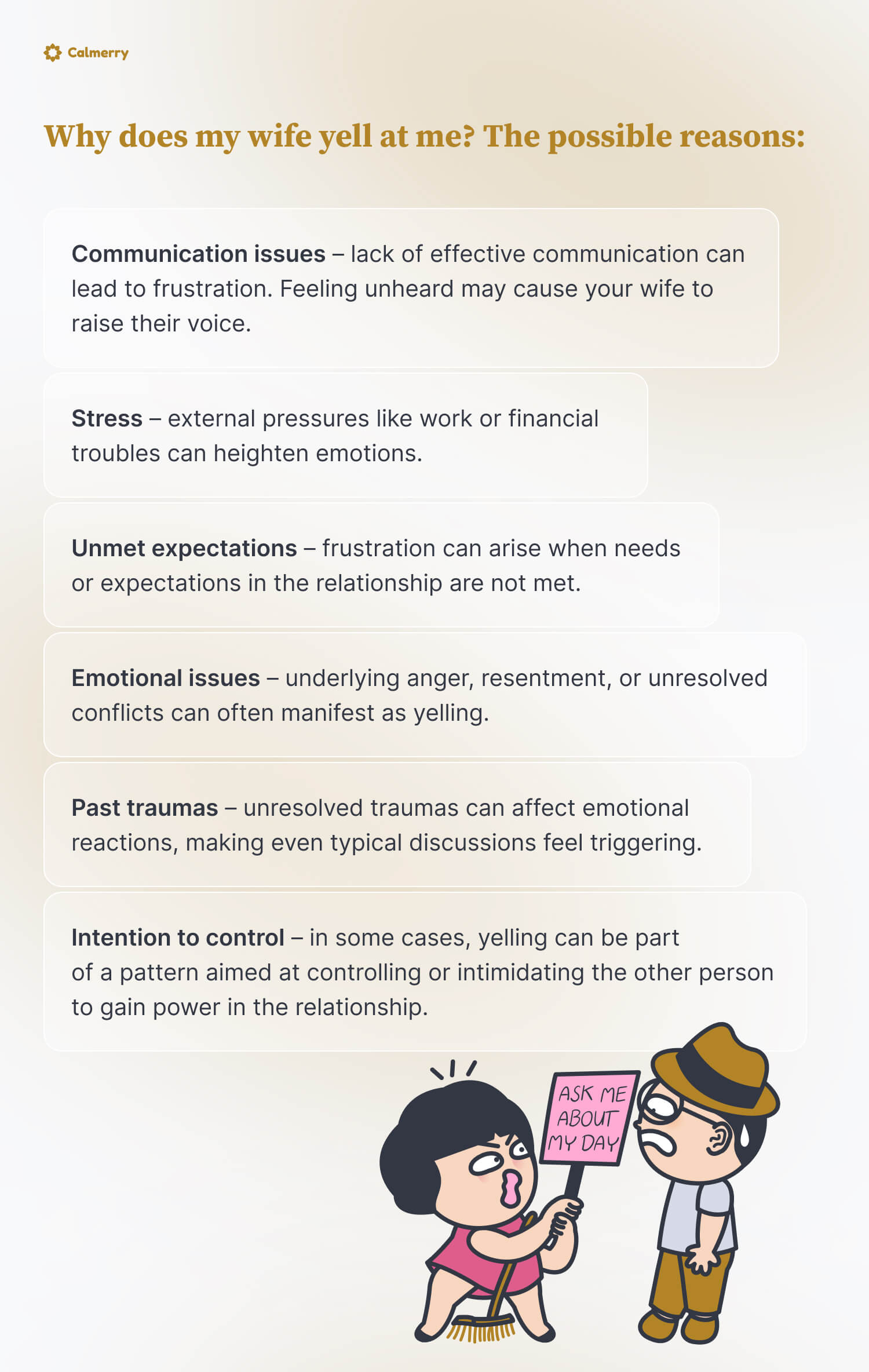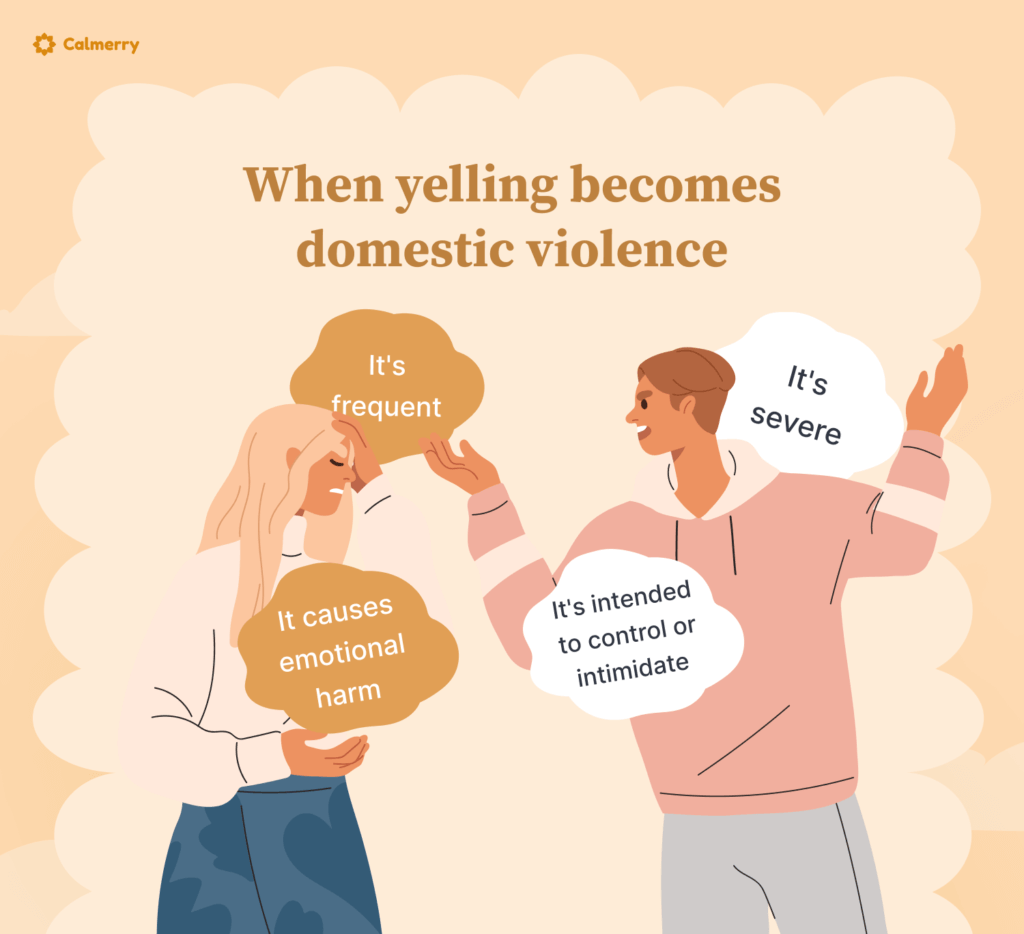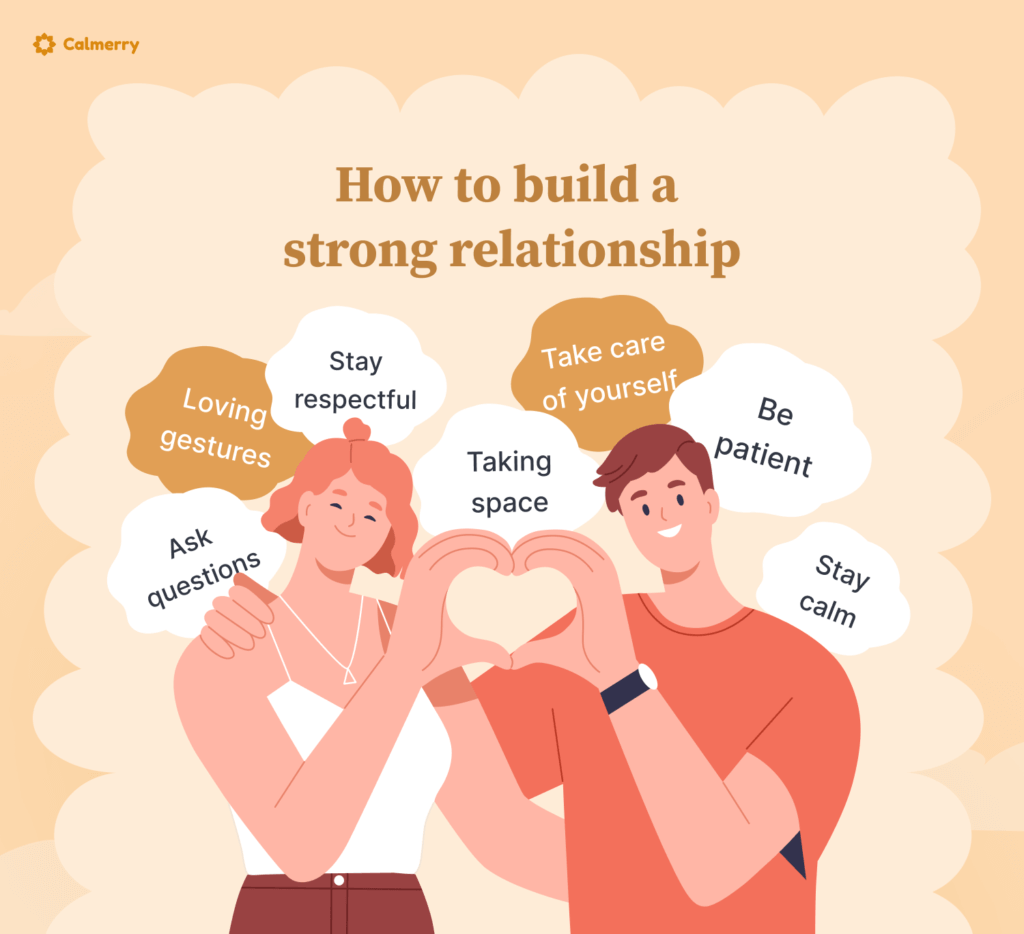My Wife Yells at Me: Understanding the Reasons and Finding Resolution

In this article
All marriages and other romantic partnerships are tough, or we encounter stressful seasons where one partner exhibits more obvious frustration than the other.
You’re not alone if yelling or verbal aggression occurs during stressful moments with your significant other.
In healthy relationships, yelling can ultimately lead to productive discussions and the expression of needs, and frustration can be constructively channeled into growth.
Conversely, yelling can feel excessive or even problematic at times. There could be a stressful period when yelling happens more frequently. It can feel like you’re lost and unsure of what to do. And is someone to blame?
“My wife yells at me” is a concern raised by spouses worldwide. It sounds alarm bells in discussions with trusted friends and family members and can sometimes signal that a marriage is in trouble. While yelling makes us uncomfortable sometimes, it typically happens for a reason.
This article will help you wrap your head around what’s happening and what you can do to alleviate some tension.
Why does my wife yell at me? Exploring the possible reasons

You want to discover why yelling happens in your marriage. Maybe it’s become uncomfortable, and you’ve felt nervous about raising your concerns for fear of triggering additional conflict. Perhaps you’re considering your options or asking yourself what is wrong.
Some marriage issues that can lead to extreme irritation and eventually yelling may include the following [1] Advanced Solutions International, Inc. (n.d.). Marital distress. https://www.aamft.org/Consumer_Updates/Marital_Distress.aspx :
She feels unheard
If your partner feels like you are dismissing their concerns or opinions or you’re not taking them seriously, they may raise their voice to increase the chances you will hear them.
Poor communication or misunderstandings can lead to frustration and, in some cases, yelling. If your wife yells, she is likely not feeling heard.
– Rychel Johnson, M.S., Licensed Clinical Professional Counselor (LCPC)
Ensuring someone important to you feels heard is powerful and creates safety. Are there ways you can alter your communication style to convey a sense of security in your marriage?
Tip: Practice active listening. When she’s speaking, make eye contact, nod along, and summarize what she’s said to show you understand. It’s common for partners to interrupt, but instead, let her finish. Validate her feelings even if you don’t agree.
Work, family, or financial stress
External stressors such as work, financial problems, or family issues can spill over into a relationship, leading to heightened emotions and arguments. While it’s expected to happen occasionally, repeated yelling episodes may indicate a more significant issue.
At times, the boundaries between work and home become blurred, resulting in a conflict that doesn’t need to happen. Is this an aspect of your life that needs some work?
Tip: Help her identify and manage these stressors. Offer to share household responsibilities, encourage her to take breaks, and discuss financial concerns openly. Offer support without trying to fix everything immediately. Try to understand the root of her stress and ask how you can help.
Poor conflict management
Lack of conflict resolution strategies can lead to yelling during disagreements. If a wife doesn’t know how to navigate conflicts effectively, she may yell out of frustration. If communication patterns are unhealthy, it can quickly escalate.
Tip: Learn and practice healthy conflict resolution techniques together. This might involve taking breaks during heated arguments, using “I” statements, or seeking help from a therapist.
Feeling disrespected
A loss of respect in a relationship can lead to frustration and resentment, which can manifest as shouting. When a wife feels disrespected, she may feel like her boundaries are being violated, leading to anger. Yelling is often a sign that a fundamental element of the relationship is broken.
Tip: Reflect on your actions and words. Have you been supportive and appreciative? Often, there are different communication needs, so be mindful of hers. Rebuild respect through consistent, positive actions and showing genuine care for her feelings.
Unmet expectations
When one partner feels their needs or expectations are unmet, it can lead to frustration and anger. Falling short in meeting a partner’s expectations isn’t always malicious – but perhaps some additional insight would be helpful.
Some examples of unmet expectations are a lack of quality time together, reduced compassion or empathy, and a lack of physical intimacy.
Seeking validation
Women often look for approval for their feelings and experiences. If a wife doesn’t feel validated by her partner, she may yell to emphasize the importance of what she’s saying. It’s a way of seeking acknowledgment and understanding.
Tip: Consciously validate her feelings, even if you don’t fully understand them. Saying things like, “I understand why you feel that way” or “That sounds really difficult” can go a long way. Try to meet her emotional needs without being judgmental.
Mental health issues
Unresolved past traumas or experiences can affect someone’s emotional reactions and lead to yelling in relationships. [2] Majani, A. F., Ghazali, S. R., Yong, C. Y., Pauzi, N., Adenan, F., & Manogaran, K. (2022). Marital conflict, trauma exposure, posttraumatic stress disorder, and depressive symptoms among Malaysian firefighters. Psychological Reports, 126(4), 1605–1619. https://doi.org/10.1177/00332941221075246
You may not understand the trauma or know the whole story, so the yelling could feel disproportionate to the conflict that caused the yelling.
If your partner has endured abuse in the past, it’s possible that what you perceive as a typical discussion could be triggering to your wife. Working to understand your partner’s trauma is healthy for marriage and often requires seeking individual or couples counseling.
– Rychel Johnson, M.S., Licensed Clinical Professional Counselor (LCPC)
Trauma survivors need to be able to share their trauma when they are ready. It does not serve the health of your relationship to pressure your significant other to disclose what happened to them.
Tip: Encourage her to seek professional help if you suspect mental health is a factor. Offer support and understanding, and be patient during the process. Remind her that seeking help is a sign of strength.
Not happy in a relationship
General unhappiness within the relationship can be a significant factor. If a wife is consistently dissatisfied with the relationship’s state, she may yell as an outlet for her unhappiness. This could be due to a lack of intimacy, differing life goals, or unresolved conflicts.
Tip: Initiate open and honest conversations about the relationship. Consider couples therapy to improve communication strategies. Work together to identify areas that need improvement and create a plan to address them, working towards a harmonious relationship.
You went out of the line
Sometimes, yelling is a direct response to a specific action or behavior that crosses a boundary. If you’ve done something to hurt, betray, or disrespect your wife, she may yell as an expression of her pain and anger. This might be a sign of a serious issue. If this turns to verbal abuse or physical abuse, it may be an abusive relationship, and it may be best to leave you feeling unsafe.
Tip: Acknowledge your mistake and sincerely apologize. Listen to her concerns without escalating or becoming defensive. Make amends and work to rebuild trust. Understand the impact of your actions and commit to changing your behavior. Remember to keep yourself safe.
Stress accumulation
Sometimes, yelling is simply the result of a gradual stress buildup. Like a pressure cooker, daily stressors can accumulate until they reach a boiling point, leading to an outburst. She may yell to release this pressure.
Tip: Encourage her to develop healthy coping mechanisms for stress, such as exercise, meditation, or hobbies. Help her recognize the early signs of stress before it escalates. Regular “check-ins” can help address issues before they boil over.
The impact of yelling
Shouting might feel like a way to express strong emotions, but it often hurts relationships. When yelling is common, it creates a tense and unpleasant home environment.
In a marriage, yelling makes disagreements worse, not better. It can lead to partners feeling hurt, angry, and distant from each other.
Instead of solving problems, yelling often makes people defensive or withdrawn. It damages trust and makes it hard to talk openly and honestly. If yelling becomes the main way of communicating, it can eventually lead to the end of the relationship.
Emotional issues
Underlying emotional issues, like anger, resentment, or unresolved conflicts, may manifest as yelling. These issues might feel like they aren’t worth discussing as they occur.
However, over time, anger and unresolved issues fester and often magnify.
Effects on children
When parents yell a lot, children are very much affected by it. Generally, they become scared, insecure, and anxious. They may start feeling responsible for the fighting, but it is not their fault.
Children learn behaviors from their parents. If they are around a lot of yelling, they could start acting out or have anger control issues. They may also struggle with making friends or solving problems without violence. Living in a home filled with yelling is stressful, and that stress can make it harder for them to do well in school and will affect their overall happiness and well-being.
Is it verbal abuse?
While shouting can damage a relationship, it isn’t always verbal abuse. Verbal abuse is something repetitive, used in an attempt to control and hurt one’s partner.
Try to reflect: Is the yelling part of an argument, or is it intended to put you down? Does she call you names, insult you, or threaten you? Does she try to control what you do by yelling? If the yelling includes insults, threats, or aims to control you, it might be abuse.
The key here is whether the yelling is intended to dominate and hurt instead of simply to express anger. If you regularly feel afraid or worthless because of her yelling, it is a serious problem, and you may want to seek out help.
Is yelling a reason that my wife hates me?
If your wife shouts at you all the time, it might not mean she hates you. She could be feeling stressed or frustrated.
For example, she might take it out on you if she had a hard day at work. Sometimes, people shout because they don’t know how to express their feelings calmly. Maybe she feels like she’s not being heard.
For instance, if you forget to do something she asked, she might shout out of frustration. Yelling can also be a habit based on past experiences.
She might have grown up in a household where shouting all the time was normal. It’s important to talk to her about how the shouting makes you feel. You both can work together to find better ways to communicate.
Seeking help from a counselor can also be very helpful.
When yelling crosses the line and becomes domestic violence
Domestic violence is a physically harmful or non-physical behavior intended to manipulate, control, or diminish another person’s self-worth.
Some typical signs of domestic violence are persistent or inappropriate name-calling or other verbal aggression, threats, or manipulation by physical force.
Domestic violence can take a severe toll on the well-being of those it impacts and lead to ongoing psychological issues.
When a partner yells at you, it may not leave physical marks, as with hands-on abuse; however, it can cause you to feel disempowered and confused. To better understand what’s going on, seeking help from a qualified therapist can be valuable.
Here are some key points to consider when yelling crosses the line into domestic violence:
Frequency and severity
Occasional arguments or raised voices in a relationship are common, and not all yelling is indicative of domestic violence.
However, when yelling becomes a regular occurrence and escalates in intensity, it can indicate an abusive pattern.

Intention to control
Domestic violence involves a pattern of behavior aimed at controlling and intimidating the other person. Yelling may be used to gain power and control in the relationship, causing the victim to feel afraid or belittled.
Emotional and psychological impact
Yelling can have long-lasting emotional and psychological consequences for the victim, including symptoms of anxiety, depression, and post-traumatic stress disorder (PTSD).
What to do if my wife shouts at me all the time: strategies for de-escalation and resolution
As discussed earlier, we can often determine what contributes to verbal outbursts through careful investigation. But how do you react to a shouting wife?
Addressing the issue calmly and constructively when your wife is yelling is essential. In many cases, it’s possible to work together to find a resolution and improve your relationship.
Here are some steps you can take to understand the reasons behind her behavior and work toward a solution:
1. Listen actively
When your wife starts yelling, listening to what she’s saying is extremely important. Try to understand her perspective and emotions. Don’t interrupt or get defensive during this stage.
2. Stay calm
Keep your own emotions in check. Yelling back or becoming defensive will only escalate the situation. Take deep breaths and maintain a calm demeanor.
3. Taking space
Establish clear boundaries regarding acceptable behavior in your relationship. Both of you should agree on how to communicate and resolve conflicts respectfully.
Following your set boundaries can take time and effort–real change takes work.
4. Loving gestures
Actions speak louder than words. Show your wife you care through small, thoughtful gestures. It could be a surprise gift, helping with chores, or simply holding her hand. These acts of love can strengthen your bond and remind her of your affection, even during tough times.
5. Apologize if needed
If you’ve made a mistake or if there’s something you need to apologize for, do so sincerely. Acknowledging your faults can help de-escalate the situation and help you move forward with a deeper understanding of one another.
6. Identify the triggers
Try to figure out what is triggering her anger. It could be stress, unresolved issues, or differences in communication styles.
Identifying the root cause can help you find a solution.
7. Ask questions
When your wife shouts at you all the time, asking questions can help calm the situation. Gently ask, “Can you tell me more about why you’re upset?” This shows you’re interested in understanding her feelings.
Questions like, “Did something specific happen today?” can help identify the root cause of her anger.
However, avoid asking questions that sound accusing, such as, “Why are you always so angry?” Instead, use questions that show empathy and a desire to resolve the issue.
8. Seek counseling support
If verbal escalation is a frequent and severe issue in your relationship, consider seeking the help of a relationship counselor or therapist. They can provide guidance and tools for improving communication.
Adding a 3-rd party or unbiased perspective is essential when relationship struggles are persistent.
9. Empathy, empathy, empathy
Try to put yourself in her shoes and understand her feelings and perspective. Empathy can go a long way in resolving disputes.
Setting aside defensiveness and being open to hearing what she is going through is essential in nurturing your marriage.
10. Work on problem-solving
Once you’ve identified the issues, work together to find solutions. Compromise and finding common ground are essential in any relationship.
Problem-solving involves trial and error that can be guided by the expertise of a therapist.
11. Monitor stress levels
High stress levels can contribute to outbursts. Encourage stress-reduction techniques such as exercise, meditation, or relaxation techniques and consider utilizing these techniques yourself!
Avoid telling someone to “just relax” or “calm down” – these comments will surely fall on resistant ears, particularly when stress is high.
12. Be patient
Changing behaviors and improving relationships takes time! Be patient with each other and acknowledge the progress you make.
13. Stay respectful
Keep your tone calm and your words gentle. Avoid shouting back, as this can escalate the situation.
Maintain eye contact to show you’re engaged in the conversation. If you need a break, politely ask for a few minutes to cool down. Show empathy by trying to understand her perspective.
Staying respectful helps build trust and a stronger relationship.
14. Take care of yourself
Ensure you are taking care of your well-being. A healthy and balanced individual is more equipped to handle relationship challenges.
Even if you aren’t joining in on the yelling, seeking individual counseling for marriage may be beneficial.
Processing conflict with a trained professional outside of your marriage is a healthy approach to improving your relationship and cultivating trust and mutual understanding.

Implementation tips
To successfully implement these steps, choose a calm moment to discuss your concerns with your wife. Explain that you want to understand her better and improve your communication. Start by incorporating active listening and staying calm during disagreements.
Gradually introduce other strategies, such as identifying triggers and seeking professional help if needed. Consider writing down your boundaries together and refer to them during discussions. Remember, progress takes time.
Rebuilding your relationship
Relationships require effort. When things get tough, it’s important to take action. Here is what you can do:
Find a connection in quality time
Life gets busy, so making time for each other is important. Dedicate uninterrupted moments to connection. Engage in shared activities, such as hobbies, walks, or simply enjoying a meal together. Focus on being present and truly listening.
Do check-ins
Consider scheduling regular meetings to discuss feelings and concerns and appreciate one another. These don’t need to be formal. A quick “How was your day?” can go a long way. Create a safe space for honest dialogue without judgment.
Analyze critical issues
Every relationship faces challenges. Identify recurring problems and work through them collaboratively. This may involve compromise, understanding different perspectives, and finding solutions that benefit both partners. Focus on problem-solving, not blaming.
When to seek help
If you cannot handle the problems yourself, then do not hesitate to seek professional help. A therapist will be able to provide guidance, tools, and a neutral perspective that will help one get through difficult times.
Healing from conflict – build your path
Arguments happen, but they don’t have to define your relationship. To heal, own your part in the conflict, and genuinely listen to your wife’s perspective. Forgive both of you and focus on moving forward together. Simple actions, like honest communication and showing appreciation, can create a stronger bond. You can choose to grow stronger together, not drift apart.
Final thoughts
Regardless of what leads to yelling, both partners need to be willing to work on the relationship. Open and respectful communication is critical to resolving issues.
If you feel like your wife’s yelling is abusive or causing harm, it’s wise to consider seeking professional advice and support from a therapist or counselor.
Relationships and communication are a two-way street, and both partners play a role in the dynamics of the relationship. Addressing conflicts takes time and, often, some solid professional help.
Individual counseling and support groups for people in similar situations can offer the support you need while sifting through the possible reasons for the tension that leads to yelling.
Additionally, online therapy on Calmerry can be convenient and beneficial to help guide you through this time.
FAQ
Why does my wife yell at me?
Your wife might yell for various reasons: frustration, stress, feeling unheard, unmet needs, or learned communication patterns. It’s rarely about you personally, but rather how she expresses her emotions or perceives the situation.
Is yelling normal in relationships?
Occasional raised voices during intense moments might happen, but frequent shouting isn’t healthy. It can indicate poor communication and unresolved issues. While it can be common in some dynamics, it is not ideal or necessary for a healthy relationship.
Is it normal for a wife to yell during arguments?
It’s more common than ideal. While some people resort to shouting when upset, it doesn’t make it a healthy or productive way to resolve conflicts. Effective communication involves expressing feelings calmly and respectfully, even when disagreeing.
How can I respond when my wife yells at me?
Stay calm. Avoid yelling back, which escalates the situation. Try to listen actively to understand her feelings. You can say, “I understand you’re upset, but it’s hard to hear you when you yell. Can we talk calmly?”
How often is too often for yelling in a marriage?
If raising a voice is a regular occurrence, it’s considered as too often. If it happens in most arguments or is used to intimidate or control, it’s a serious problem. Healthy relationships prioritize respectful communication, even during disagreements.
What makes yelling cross into emotional abuse?
Shouting becomes abusive when it’s used to belittle, control, intimidate, or demean. Personal attacks, name-calling, threats, or constant criticism alongside yelling are red flags. It’s about the intent and impact of the yelling.
Should I avoid conflict to prevent yelling?
No, avoiding conflict is unhealthy. It leads to resentment and unresolved issues. Learn to address disagreements constructively, focusing on understanding each other’s perspectives and finding solutions together, rather than avoiding the issue.
When should we consider marriage counseling?
Consider therapy if yelling is frequent, communication is poor, you struggle to resolve conflicts, or there’s a pattern of disrespect. A therapist can help you communicate effectively and address underlying issues.
Can couples therapy help reduce yelling in a relationship?
Yes, counseling can help. It provides a safe space to address communication issues, learn conflict resolution skills, and understand each other’s emotional triggers.
When should I worry about yelling in my marriage?
If shouting is frequent, it may escalate to emotional abuse and leave you feeling constantly anxious or scared, or it involves threats or intimidation. If you’re concerned about your safety or well-being, seek help.
Advanced Solutions International, Inc. (n.d.). Marital distress. https://www.aamft.org/Consumer_Updates/Marital_Distress.aspx
Majani, A. F., Ghazali, S. R., Yong, C. Y., Pauzi, N., Adenan, F., & Manogaran, K. (2022). Marital conflict, trauma exposure, posttraumatic stress disorder, and depressive symptoms among Malaysian firefighters. Psychological Reports, 126(4), 1605–1619. https://doi.org/10.1177/00332941221075246
online therapy
live video session




